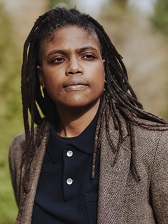LaShandra Sullivan
Associate Professor of Anthropology and Co-Director of the Sexualities Project at Northwestern (SPAN)
Curriculum Vitae

- sullivan@northwestern.edu
- 847 491-4821
- 1812 Hinman, #301
Biography
LaShandra Sullivan is a cultural anthropologist whose research focuses on land and property, racialized and gendered labor, and LGBTQ+ politics. Sullivan’s current research centers on ethnographic and archival research in Mississippi and Brazil. She studies practices of land holding and relations to property in her home state of Mississippi, as well as LGBTQ+ activism in the state. She also conducts ethnographic research with Black and LGBTQ+ activists in Rio de Janeiro. She published a book in 2023 based on prior fieldwork with Indigenous land activists in Mato Grosso do Sul, Brazil titled Unsettling Agribusiness: Indigenous Protests and Land Conflict in Brazil.
Selected Publications
2025 “The Radical Potential of LGBTQ Activism,” Annual Review of Anthropology 54: 377-391. https://doi.org/10.1146/annurev-anthro-041422-022915
2025 “Spirit Owners, Ethno-Racial Critique, and Indigenous Land Struggle in Brazil,” PoLar: Political and Legal Anthropology Review 48(1). http://dx.doi.org/10.1111/plar.70003
2025 “Property and the Matter of Belonging,” Co-Authors Meghan Morris, Gregory Duff Morton, and Lee Cabatingan. Introduction to Special Section of PoLar: Political and Legal Anthropology Review 48(1). http://dx.doi.org/10.1111/plar.70005
2023 Unsettling Agribusiness: Indigenous Protests and Land Conflict in Brazil. Lincoln: University of Nebraska Press.
2022 “Segurando a Onda: Resiliência negra e LGBTI+ feminismo em meio à virada reacionária no Rio de Janeiro” in Democracia Precária: Etnografias de Esperança, Desespero, e Resistência no Brasil. Edited by Benjamin Junge, Alvaro Jarrin, Lucia Cantero, and Sean T. Mitchell. Porto Alegre: Editora Zouk.
2021 “The Overseen and Unseen: Agribusiness Plantations and Indigenous Land Struggle in Brazil,” American Anthropologist 123(1):82-95. https://doi.org/10.1111/aman.13519
2021 “Holding the Wave: Black LGBTI+ Feminist Resilience Amidst the Reactionary Turn in Rio de Janeiro”, in Precarious Democracy: Ethnographies of Hope, Despair, and Resistance in Brazil After the Pink Tide. Edited by Benjamin Junge, Alvaro Jarrin, Lucia Cantero, and Sean T. Mitchell. Newark: Rutgers University Press.
2020 “Re-Thinking the State in Africa Through Gabon’s Aesthetics of Governance,” Social Dynamics: a Journal of African Studies 46(1):104-131. https://doi.org/10.1080/02533952.2020.1747737
2017 “Black Invisibility on a Brazilian ‘Frontier’: Land and Identity in Mato Grosso do Sul, Brazil,” African and Black Diaspora: An International Journal 10(2): 131-142. https://doi.org/10.1080/17528631.2016.1189694
2013 “Identity, Territory, and Land Conflict in Brazil,” Development and Change 44(2): 451-471. https://doi.org/10.1111/dech.12010
2013 “Identity, Territory, and Land Conflict in Brazil” in Governing the Global Land Grab: The Role of the State in the Rush for Land. Edited by Wendy Wolford, Saturnino M. Borras Jr., Ruth Hall, Ian Scoones, and Ben White, London: Wiley.
